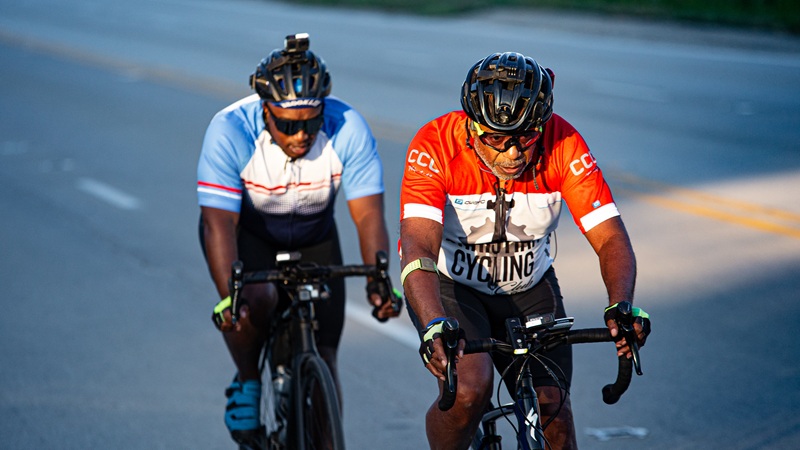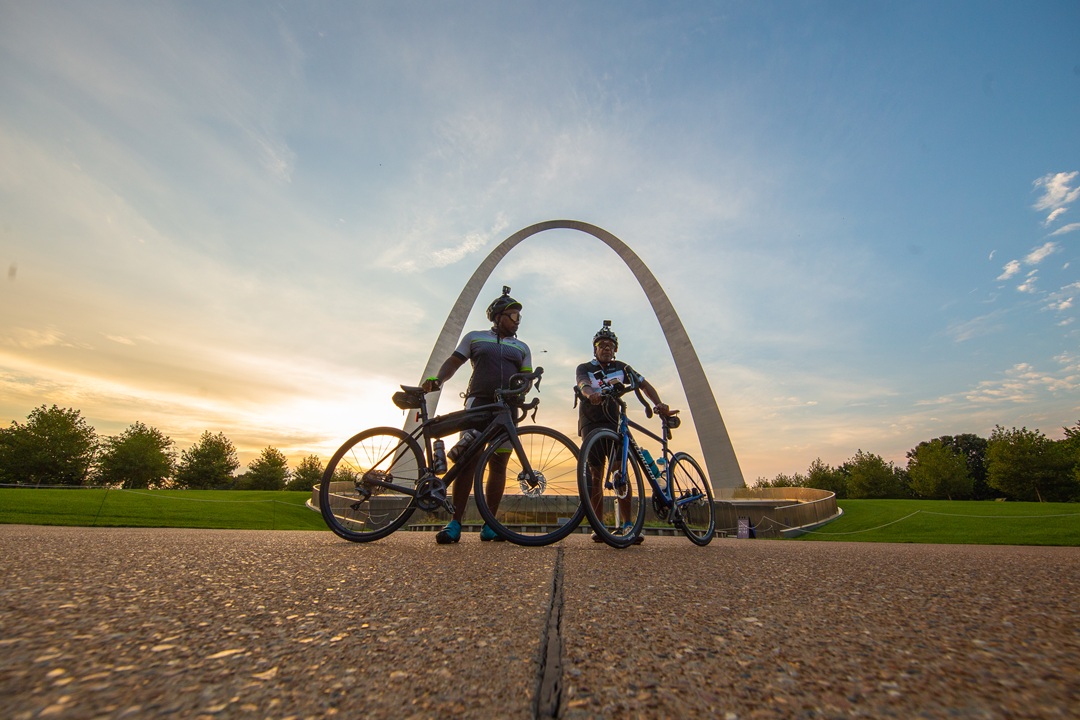The first time Donnie Seals rode a bicycle a quarter mile around his block in a Chicago suburb, it was “a big achievement for me,” he says in a new documentary, Bike Vessel.
That’s because Donnie had undergone three open-heart surgeries. During preparation for his third surgery, his body rejected a dye, and he flatlined.
“That is when I realized I needed to make a change,” Donnie, who became an avid cyclist, says in the documentary.
That transformation resulted in Donnie, at age 70, and his son Eric Seals, 35, attempting a four-day, 350-mile ride from St. Louis to Chicago, where they both live.
Eric, a filmmaker, directed the documentary, which not only traces his father’s journey and their ride but also explores the reasons why Black people in America are more likely to die from heart disease and have a lower life expectancy than white people.
Eric said he wanted to use his dad as a vessel for illuminating those health disparities because Donnie was a middle-class Black man who worked for a large, successful company, IBM.
“I think it’s easy to say, ‘Well, certain people aren’t living in the greatest health, and they don’t have access to health care,’ but what happens when they do? And so I wanted to examine that,” Eric, whose documentary premiered on PBS in February, tells Terrain.
In the film, Donnie offers a way to help address this health disparity: exercise.
But for Donnie and others, it is not always as easy as just hopping on a bike or lacing up a pair of running shoes. In the documentary, Eric intersperses the story of his father’s cycling with experts who discuss how the discrimination Black people have faced in the United States, including in the workplace and health-care settings, contributes to their poor health relative to white people.
While working at IBM in the 1980s, Donnie, a software instructor, stood out as a Black man among his white colleagues and felt such pressure that he once stayed up all night to learn a code, worried that he would be fired if he couldn’t solve it. (He ultimately figured it out.)
“Stress can also come from racism and discrimination,” Dr. Medell Briggs-Malonson, chief of health equity, diversity, and inclusion for the UCLA Hospital and Clinic System, notes in the documentary. “The discrimination that we experience or perceive directly correlates with stress, which raises certain chemicals in our body, so it causes our heart rate to get higher.”
The documentary also looks at how Black people have been treated in science and health care and how that continues to fuel their distrust of the medical system. For example, African-American men were subjected to the Tuskegee Experiment, in which the federal government examined the effects of untreated syphilis by studying Black men with the infection and not offering them available treatment.

Eric (left) and Donnie Seals en route to Chicago from St. Louis in Bike Vessel. (Timothy M. Schmidt)
Today, Black people are more likely than white people to say they felt they were treated unfairly by a health-care provider due to their race and ethnicity and to report negative experiences such as being refused pain medication they thought they needed, according to a study from the Kaiser Family Foundation.
Donnie recalls how, after his second surgery, he still felt something wasn’t right, but when he raised his concerns, the doctor said, “Well, we opened you up like a chicken; what do you expect?”
He found a different cardiologist and ultimately underwent a third surgery.
In addition to the historical wrongs, “The distrust now comes from our inability to deliver high-quality health-care services to everybody equitably,” Dr. Stanley Frencher, a urologist and associate professor at UCLA, says in the documentary.
As such, he says, African Americans’ life expectancy is about five years shorter than white people, according to Kaiser.
Despite his heart health issues, Donnie was able to ride consistently enough that he no longer needed the 20 pills he had been taking each day.
“My cardiologist says my biking is my medication,” Donnie says.
To celebrate five years since his father started cycling, Eric suggested they go on a long, multi-day ride. They settled on St. Louis as the launch point and contacted Ride Illinois, a nonprofit organization dedicated to promoting biking, which created a route for the father-son duo.
After training for more than three months, Donnie and Eric shipped off from the Gateway Arch and encountered issues that cyclists of all races, genders, and ethnicities face: closed paths, strong headwinds, repeated flat tires, and flagging energy.
In fact, before they had generated any momentum, they ran into construction along the St. Louis riverfront.
“We can’t even get out of St. Louis,” Eric says during the film and laughs.
They eventually found a path and crossed the McKinley Bridge over the Mississippi River.
“Going across the bridge was a high point” because it meant “we’re on our way now,” Donnie tells Terrain.
From there, they mostly rode along Illinois’ Route 66 trail, which the state has been building since 2005.
“There are parts of Route 66 that were just absolutely gorgeous,” Donnie says. There were “newly paved paths that were so smooth and really nice.”
Still, there were bumps along the way.
Eric got a flat tire. And then he got another. And another. And another.
Donnie says they perhaps could have avoided the repeated flats if he had better cleared the rim of debris, but they were also trying to do so on the side of the road, with trucks passing. The experience made Donnie switch to tubeless tires.
“The jury is still out on tubeless” because they can be messy, Donnie says. “But I’ve had a flat on the road with tubeless, and all you do is you plug it, you fill it up, and you go, so that’s nice.”
At one point during the trip, Eric joked that he would “so happily get in a truck or a car of a random person.”
But toward the end of the ride, the pair overcame any communication issues, including over who should lead versus draft.
“We are listening to each other, and we really got to the point where the wind was so harsh that it was much easier for us to ride together,” Eric says.
For people interested in doing a similar ride, Donnie advises that they check their planned route in advance for construction and other events that could be blocking traffic. They did their ride over Labor Day weekend and encountered parades.
“We just kind of went through,” Donnie says and laughs. “We were looking to get through right before the parade. People were lined up. But it was a memorable route.”
Groups such as Trailnet have screened the documentary three times around St. Louis. Eric says the response from audience members was better in St. Louis than in any other city. Some people, including many Black cyclists, attended all three events.
“It was an amazing experience to just have that community around you,” Eric tells Terrain.
PBS representatives twice rejected Eric’s request to have the network air the film and make it available on their website. Eric decided he would try once more, and the public broadcaster finally agreed. Eric says he was glad they picked it up because unlike some streaming services, they don’t keep the film behind a paywall.
“My number-one goal was to make sure that the film is getting in front of the right eyeballs, people who want to make a change,” says Eric, who runs a production company, Digifé.
Regarding the higher rates of health issues in the Black community, Eric says he doesn’t think it can be fixed with one answer, but “it starts with education on what you’re eating.”
Donnie, who is now 72 and in good health, agrees that education is the key. He says it’s essential to become knowledgeable about a health condition if you have been diagnosed with it.
“It enables me to ask questions and gain an understanding of what is happening with the medications and their side effects,” Donnie says.
And, of course, people can benefit from Donnie’s medication: exercise.
In the documentary, Donnie, who continues to ride, recalls that people tell him they want to make a change but say, “I can’t do what you’re doing.”
“My comment is, you don’t have to do what I’m doing. Find something that you enjoy and do it,” Donnie says. “I chose cycling.”
The documentary Bike Vessel is available to watch here.
Eric Berger is a contributor to Terrain.
Top image: Eric (left) and Donnie Seals in St. Louis at the start of their cycling journey. (Timothy M. Schmidt)


Leave A Comment